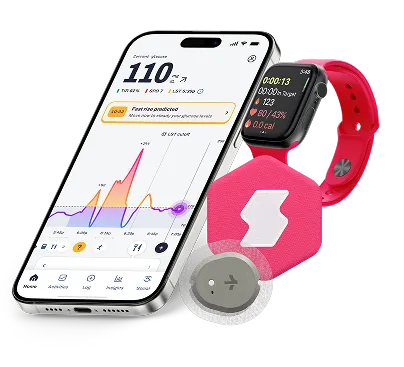Raspberries, a popular summer fruit known for their vibrant color and distinct flavor, offer more than just a delicious addition to desserts and snacks. In recent years, they have gained attention for their potential benefits in managing blood sugar levels due to their notably low glycemic index.
Raspberries as a rich source of dietary fiber, antioxidants, and essential vitamins, including vitamin C and vitamin K.¹ Additionally, their high content of ellagic acid has been associated with potential anti-diabetic effects, making them a promising addition to the diets of individuals with type 2 diabetes.
This article explores the intricate relationship between raspberries and glycemic control, shedding light on how this berry can contribute to overall well-being and health.
Sign up to be the first to know about special offers and exciting Signos news.
Glycemic Index Table
The nutritional profile of raspberries, based on a serving size of 100g, yields the following calculations:
Glycemic Index: Raspberries have a low glycemic index, typically around 26.² The glycemic index (GI) ranks how quickly a carbohydrate-containing food raises blood glucose levels. Foods with a low GI (55 or less) are digested and absorbed more slowly, causing a lower and slower rise in blood glucose levels. This property makes raspberries an excellent choice for individuals aiming to manage their blood sugar levels effectively.
Carbohydrates per Serving: With a serving size of 100g, raspberries contain approximately 12g of carbohydrates.¹ These carbohydrates primarily consist of natural sugars, dietary fiber, and other complex carbohydrates that contribute to the overall health benefits of the fruit.
Glycemic Load per Serving: Given their low carbohydrate content, raspberries have a low glycemic load (GL). The glycemic load considers both the quality and quantity of carbohydrates in a serving of food, providing a more accurate reflection of how the food may affect blood sugar levels. Raspberries' low glycemic load further supports their suitability for maintaining stable blood sugar levels.
It's worth noting that cooking or processing raspberries can potentially impact their glycemic index. While cooking may soften the berries and slightly increase the glycemic index, the overall impact is still relatively low, given their high fiber content. This aspect emphasizes the importance of considering the broader dietary context when assessing the impact of a particular food item on glycemic control.

Nutritional Facts
Raspberries are nutrient-dense fruits known for their rich antioxidant content, providing essential vitamins and minerals such as vitamin C, vitamin K, and manganese. They are also a good source of dietary fiber, contributing to digestive health and aiding in maintaining stable blood sugar levels. A 100-gram serving of raspberries contains approximately 52 calories, 1.2 grams of protein, 6.5 grams of dietary fiber, and 12 grams of carbohydrates, making them a healthy and flavorful addition to a balanced diet.¹
The nutritional information below is for 100 g of raspberries.¹
Nutritional Facts

Is Raspberry Good for Weight Loss?
Raspberries can be a beneficial addition to a weight loss diet due to their low-calorie and high-fiber content. With only about 52 calories per 100g serving, raspberries provide a satisfying and nutrient-dense option for those looking to manage their weight.¹ The high fiber content can contribute to increased satiety and improved digestive health, helping individuals feel fuller for longer periods. Furthermore, the presence of ketones in raspberries has been suggested to potentially aid in the breakdown of fat cells, although further research is needed to fully establish their weight loss benefits.
Is Raspberry Safe for People Living with Diabetes?
Raspberries can be a beneficial addition to the diet of individuals with diabetes, owing to their low glycemic index and high fiber content. The American Diabetes Association recommends incorporating low-glycemic-index fruits like raspberries into meal plans for individuals with diabetes to help manage blood sugar levels.
Furthermore, the antioxidants and polyphenols present in raspberries have been associated with potential anti-diabetic effects, including improved insulin sensitivity and reduced oxidative stress. It is essential, however, for individuals with diabetes to monitor their overall carbohydrate intake and consult a healthcare professional to incorporate raspberries or any other food items into a well-balanced meal plan tailored to their specific dietary needs and health goals.
Better health starts here.
Sign up for tips and insights that work for you!
Allergies
Though relatively uncommon, allergies to raspberries can trigger mild to severe reactions in susceptible individuals. These reactions may include symptoms such as itching, hives, swelling, or, in more severe cases, anaphylaxis.³ While raspberries are generally considered safe and nutritious, individuals with known allergies to other fruits or a history of oral allergy syndrome should exercise caution and consult a healthcare professional if they experience any adverse reactions after consuming raspberries.

References
References
- USDA FoodData Central. (2022, October 28). Food Details - Raspberries, raw. https://fdc.nal.usda.gov/fdc-app.html#/food-details/2346410/nutrients
- The University of Sydney. (2023, May 1). Glycemic Index – Glycemic Index Research and GI News. https://glycemicindex.com/
- American Academy of Allergy Asthma and Immunology. (2020, September 28). Oral allergy syndrome. https://www.aaaai.org/tools-for-the-public/conditions-library/allergies/oral-allergy-syndrome-(oas)




.svg)
.svg)
.svg)
.svg)
.svg)
.svg)
.svg)
.svg)
